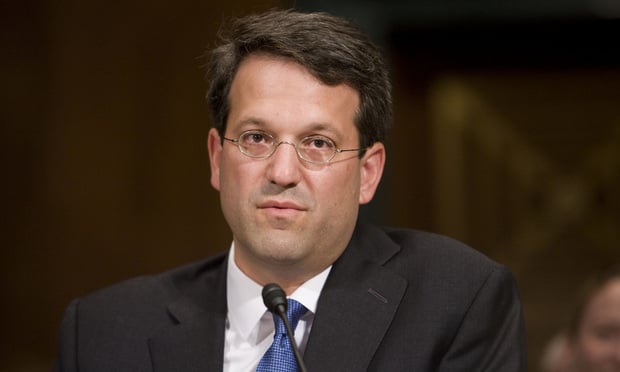NY, NJ and Others Can Proceed With Suit Over White House Census Citizenship Question
A Manhattan federal court judge on Tuesday made a preliminary finding that there was “strong” evidence the Trump administration acted in bad faith when deciding to ask about citizenship on the 2020 census in ruling to move forward New York Attorney General Barbara Underwood's lawsuit over the question about citizenship.
July 03, 2018 at 04:43 PM
4 minute read
The original version of this story was published on Litigation Daily
 U.S. District Judge Jesse Furman. Photo: Diego M. Radzinschi/ALM A Manhattan federal court judge on Tuesday made a preliminary finding that there was “strong” evidence the Trump administration acted in bad faith when deciding to ask about citizenship on the 2020 census in a ruling to move forward New York Attorney General Barbara Underwood's lawsuit over the question about citizenship. U.S. District Judge Jesse Furman of the Southern District of New York made the finding in a ruling from the bench, Underwood's office said in a news release. The ruling came after oral arguments on a motion to dismiss by the administration, which was not decided Tuesday according to a spokesman from the U.S. Department of Commerce. The decision means Underwood's office may proceed with discovery in the lawsuit, which was filed in April by attorneys general from 18 states, including New Jersey. The coalition is suing to block the Trump administration from asking about citizenship on the upcoming census. Underwood is leading the lawsuit. She hopes to learn through discovery what went into the decision by federal officials to reinstate the citizenship question. “Today marked a major win in our lawsuit to protect the census, with a federal judge ordering the Trump administration to provide vital information on how the decision to demand citizenship status was made, and what it may mean for New Yorkers and Americans across the country,” Underwood said in a statement. The attorneys general claim in their lawsuit that asking about citizenship will decrease turnout in states with large immigration populations, like New York. That could cause those states to have fewer representatives in Congress and the Electoral College. A smaller recorded population could also mean less federal funding in areas like education and health care, according to Underwood. “By demanding the citizenship status of each resident, the Trump administration is breaking with decades of policy and potentially causing a major undercount that would threaten billions in federal funds and New York's fair representation in Congress and the Electoral College,” Underwood said. The Commerce Department announced in March that the question would appear on the 2020 census. According to a press release, the U.S. Department of Justice requested the change in December 2017. Officials at those agencies thought adding the question would help better enforce the Voting Rights Act, the release said. Commerce Secretary Wilbur Ross then wrote a memo on June 21 about the decision, in which he said his agency had already considered adding the citizenship question before the Justice Department made their request. “Soon after my appointment as secretary of commerce, I began considering various fundamental issues regarding the upcoming 2020 census, including funding and content,” Ross wrote. “Part of these considerations included whether to reinstate a citizenship question, which other senior administration officials had previously raised.” “We are disappointed that the court in New York did not defer fact discovery until after a ruling on a motion to dismiss," the spokesman said. "We are confident that the plaintiffs' case is without merit, that any allegations of bad faith are specious, and that we will prevail in court. We look forward to continuing to work with the Census Bureau to conduct a complete and accurate 2020 census.” Underwood is joined in the lawsuit by attorneys general from Connecticut, Delaware, Illinois, Iowa, Maryland, Massachusetts, Minnesota, New Jersey, New Mexico, North Carolina, Oregon, Pennsylvania, Rhode Island, Virginia, Vermont, Washington and the District of Columbia.
U.S. District Judge Jesse Furman. Photo: Diego M. Radzinschi/ALM A Manhattan federal court judge on Tuesday made a preliminary finding that there was “strong” evidence the Trump administration acted in bad faith when deciding to ask about citizenship on the 2020 census in a ruling to move forward New York Attorney General Barbara Underwood's lawsuit over the question about citizenship. U.S. District Judge Jesse Furman of the Southern District of New York made the finding in a ruling from the bench, Underwood's office said in a news release. The ruling came after oral arguments on a motion to dismiss by the administration, which was not decided Tuesday according to a spokesman from the U.S. Department of Commerce. The decision means Underwood's office may proceed with discovery in the lawsuit, which was filed in April by attorneys general from 18 states, including New Jersey. The coalition is suing to block the Trump administration from asking about citizenship on the upcoming census. Underwood is leading the lawsuit. She hopes to learn through discovery what went into the decision by federal officials to reinstate the citizenship question. “Today marked a major win in our lawsuit to protect the census, with a federal judge ordering the Trump administration to provide vital information on how the decision to demand citizenship status was made, and what it may mean for New Yorkers and Americans across the country,” Underwood said in a statement. The attorneys general claim in their lawsuit that asking about citizenship will decrease turnout in states with large immigration populations, like New York. That could cause those states to have fewer representatives in Congress and the Electoral College. A smaller recorded population could also mean less federal funding in areas like education and health care, according to Underwood. “By demanding the citizenship status of each resident, the Trump administration is breaking with decades of policy and potentially causing a major undercount that would threaten billions in federal funds and New York's fair representation in Congress and the Electoral College,” Underwood said. The Commerce Department announced in March that the question would appear on the 2020 census. According to a press release, the U.S. Department of Justice requested the change in December 2017. Officials at those agencies thought adding the question would help better enforce the Voting Rights Act, the release said. Commerce Secretary Wilbur Ross then wrote a memo on June 21 about the decision, in which he said his agency had already considered adding the citizenship question before the Justice Department made their request. “Soon after my appointment as secretary of commerce, I began considering various fundamental issues regarding the upcoming 2020 census, including funding and content,” Ross wrote. “Part of these considerations included whether to reinstate a citizenship question, which other senior administration officials had previously raised.” “We are disappointed that the court in New York did not defer fact discovery until after a ruling on a motion to dismiss," the spokesman said. "We are confident that the plaintiffs' case is without merit, that any allegations of bad faith are specious, and that we will prevail in court. We look forward to continuing to work with the Census Bureau to conduct a complete and accurate 2020 census.” Underwood is joined in the lawsuit by attorneys general from Connecticut, Delaware, Illinois, Iowa, Maryland, Massachusetts, Minnesota, New Jersey, New Mexico, North Carolina, Oregon, Pennsylvania, Rhode Island, Virginia, Vermont, Washington and the District of Columbia.This content has been archived. It is available through our partners, LexisNexis® and Bloomberg Law.
To view this content, please continue to their sites.
Not a Lexis Subscriber?
Subscribe Now
Not a Bloomberg Law Subscriber?
Subscribe Now
NOT FOR REPRINT
© 2025 ALM Global, LLC, All Rights Reserved. Request academic re-use from www.copyright.com. All other uses, submit a request to [email protected]. For more information visit Asset & Logo Licensing.
You Might Like
View All
3rd Circuit Strikes Down NLRB’s Monetary Remedies for Fired Starbucks Workers


As Trafficking, Hate Crimes Rise in NJ, State's Federal Delegation Must Weigh in On New UN Proposal
4 minute read
Trending Stories
- 1AI's Place in Big Law Broadens, As Firms Embrace Fresh Uses of the Technology
- 2Critical Mass With Law.com’s Amanda Bronstad: First Lawsuits Over Los Angeles Wildfires Name Edison, J&J Talc Trial in Los Angeles Delayed As Fires Rage
- 3Five Key Predictions on How AI Will Reshape Law Firms in 2025
- 4Congress Should Reconsider the Laken Riley Act
- 5Manhattan DA Says Trump's Ongoing State and Federal Appeals Are Now Moot
Who Got The Work
J. Brugh Lower of Gibbons has entered an appearance for industrial equipment supplier Devco Corporation in a pending trademark infringement lawsuit. The suit, accusing the defendant of selling knock-off Graco products, was filed Dec. 18 in New Jersey District Court by Rivkin Radler on behalf of Graco Inc. and Graco Minnesota. The case, assigned to U.S. District Judge Zahid N. Quraishi, is 3:24-cv-11294, Graco Inc. et al v. Devco Corporation.
Who Got The Work
Rebecca Maller-Stein and Kent A. Yalowitz of Arnold & Porter Kaye Scholer have entered their appearances for Hanaco Venture Capital and its executives, Lior Prosor and David Frankel, in a pending securities lawsuit. The action, filed on Dec. 24 in New York Southern District Court by Zell, Aron & Co. on behalf of Goldeneye Advisors, accuses the defendants of negligently and fraudulently managing the plaintiff's $1 million investment. The case, assigned to U.S. District Judge Vernon S. Broderick, is 1:24-cv-09918, Goldeneye Advisors, LLC v. Hanaco Venture Capital, Ltd. et al.
Who Got The Work
Attorneys from A&O Shearman has stepped in as defense counsel for Toronto-Dominion Bank and other defendants in a pending securities class action. The suit, filed Dec. 11 in New York Southern District Court by Bleichmar Fonti & Auld, accuses the defendants of concealing the bank's 'pervasive' deficiencies in regards to its compliance with the Bank Secrecy Act and the quality of its anti-money laundering controls. The case, assigned to U.S. District Judge Arun Subramanian, is 1:24-cv-09445, Gonzalez v. The Toronto-Dominion Bank et al.
Who Got The Work
Crown Castle International, a Pennsylvania company providing shared communications infrastructure, has turned to Luke D. Wolf of Gordon Rees Scully Mansukhani to fend off a pending breach-of-contract lawsuit. The court action, filed Nov. 25 in Michigan Eastern District Court by Hooper Hathaway PC on behalf of The Town Residences LLC, accuses Crown Castle of failing to transfer approximately $30,000 in utility payments from T-Mobile in breach of a roof-top lease and assignment agreement. The case, assigned to U.S. District Judge Susan K. Declercq, is 2:24-cv-13131, The Town Residences LLC v. T-Mobile US, Inc. et al.
Who Got The Work
Wilfred P. Coronato and Daniel M. Schwartz of McCarter & English have stepped in as defense counsel to Electrolux Home Products Inc. in a pending product liability lawsuit. The court action, filed Nov. 26 in New York Eastern District Court by Poulos Lopiccolo PC and Nagel Rice LLP on behalf of David Stern, alleges that the defendant's refrigerators’ drawers and shelving repeatedly break and fall apart within months after purchase. The case, assigned to U.S. District Judge Joan M. Azrack, is 2:24-cv-08204, Stern v. Electrolux Home Products, Inc.
Featured Firms
Law Offices of Gary Martin Hays & Associates, P.C.
(470) 294-1674
Law Offices of Mark E. Salomone
(857) 444-6468
Smith & Hassler
(713) 739-1250






